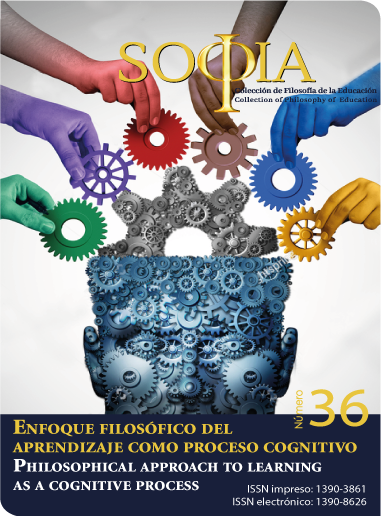The Role of Emotions in the Performance Society
Main Article Content
Abstract
Article Details

This work is licensed under a Creative Commons Attribution-NonCommercial-ShareAlike 4.0 International License.
Authorship: The list of authors signing must include only those people who have contributed intellectually to the development of the work. Collaboration in the collection of data is not, by itself, a sufficient criterion of authorship. "Sophia" declines any responsibility for possible conflicts arising from the authorship of the works that are published.
Copyright: The Salesian Polytechnic University preserves the copyrights of the published articles, and favors and allows their reuse under the Creative Commons Attribution-NonCommercial-ShareAlike 3.0 Ecuador license. They may be copied, used, disseminated, transmitted and publicly displayed, provided that: i) the authorship and the original source of their publication (journal, editorial and work URL) are cited; (Ii) are not used for commercial purposes; Iii) mention the existence and specifications of this license.
References
Arnold, M. (1960). Emotion and Personality. New York: Columbia University Press.
Berlant, L. (2020). El optimismo cruel. Madrid: Caja Negra Editora.
Brennan, T. (2005). The Stoic Life: Emotions, Duties, and Fate. Oxford: Oxford University Press.
Brentano, F. (1935). Psicología. Madrid: Revista de Occidente.
Crisipo de Solos. (trad. 2006). Testimonios y Fragmentos. (J. Campos Daroca, & M. Nava, Trads.) Madrid: Gredos.
Elster, J. (2002). Alquimias de la mente. La racionalidad y las emociones. (A. Santos, Trad.) Barcelona: Paidós.
Frijda, N. (2007). The Laws of Emotions. London: Lawrence Erbaum Associates.
Graver, M. (2007). Stoicism and Emotion. Chicago: The University of Chicago Press.
Greenspan, P. (2004). Practical Reasoning and Emotion. En A. Mele, & P. Rawling (Edits.), The Oxford handbook of rationality. Londres: Oxford University Press.
Han, B. C. (2012). La sociedad del cansancio. Barcelona: Herder.
Han, B. C. (2013). La sociedad de la transparencia. Barcelona: Herder.
Han, B. C. (2014a). Psicopolítica. Neoliberalismo y nuevas técnicas de poder. Barcelona: Herder.
Han, B. C. (2014b). En el enjambre. Barcelona: Herder.
Han, B. C. (2021). No-cosas. Quiebras del mundo de hoy. Madrid: Taurus.
Han, B. C. (2022). Infocracia. La digitalización y la crisis de la democracia. Madrid: Taurus.
Knuuttila, S. (2004). Emotions in Ancient and Medieval Philosophy. Oxford: Clarendon Press.
Lazarus, R. (1991). Emotion and Adaptation. New York: Oxford University Press.
Lazarus, R. (2000). Estrés y emoción: manejo e implicaciones en nuestra salud. Bilbao: Desclée de Brouwer.
Lazzarato, M. (2015). Gobernar a través de la deuda: tecnologías del poder del capitalismo neoliberal. Amorrortu.
Long, A. (1996). Stoic Studies. Cambridge: Cambridge University Press.
Lyons, W. (1993). Emoción. Barcelona: Anthropos.
Mallamaci, M. (2017). El poder psicopolítico en las sociedades postdisciplinarias del homo digitalis. Apuntes sobre el pensamiento de Byung-Chul han. Revista Latina de Sociología, 7(1), 74-94. doi:https://doi.org/10.17979/relaso.2017.7.1.2135
Nussbaum, M. (1997). Justicia poética. La imaginación literaria y la vida pública. (C. Gardini, Trad.) Barcelona: Andrés Bello.
Nussbaum, M. (2003). La terapia del deseo. Teoría y práctica en la época helenística. (M. Candel, Trad.) Barcelona: Paidós.
Nussbaum, M. (2008). Paisajes del pensamiento. La inteligencia de las emociones. (A. Maira, Trad.) Barcelona: Paidós.
Ortony, A., Clore, G., & Collins, A. (1988). The Cognitive Structure of the Emotions. Cambridge: Cambridge University Press.
Pinedo, I. (2021). Martha Nussbaum y la justicia compasiva: un análisis crítico de la teoría de las emociones morales. Bogotá: Universidad Nacional de Colombia.
Pinedo, I., & Yáñez, J. (2017). Las emociones y la vida moral: una lectura desde la teoría cognitivo-evaluadora de Martha Nussbaum. Veritas(36), 47-72. doi:10.4067/S0718-92732017000100003
Plutchik, R., & Kellerman, H. (1980). Emotion. Theory, Research, and Experience. Volume 1, Theories of Emotion. New York: Academic Press.
Roseman, I., & Smith, C. (2001). Appraisal Theory: Overview, Assumptions, Varieties, Controversies. En K. Scherer, A. Schorr, & T. Johnstone (Edits.), Appraisal Processes in Emotion: Theory, Methods, Research (págs. 3-19). New York: Oxford University Press.
Saidel, M. (2016). La fábrica de la subjetividad neoliberal: del empresario de sí al hombre endeudado. Pléyade(17), 131-154.
Solomon, R. (2003). Not Passion´s Slave. Emotions and Choice. Oxford, UK: Oxford University Press.
Solomon, R. (2007). Ética emocional: una teoría de los sentimientos. Barcelona: Paidós.
Tieleman, T. (2003). Chrysippus On Affections: Reconstructions and Interpretations. Leiden: Brill.

